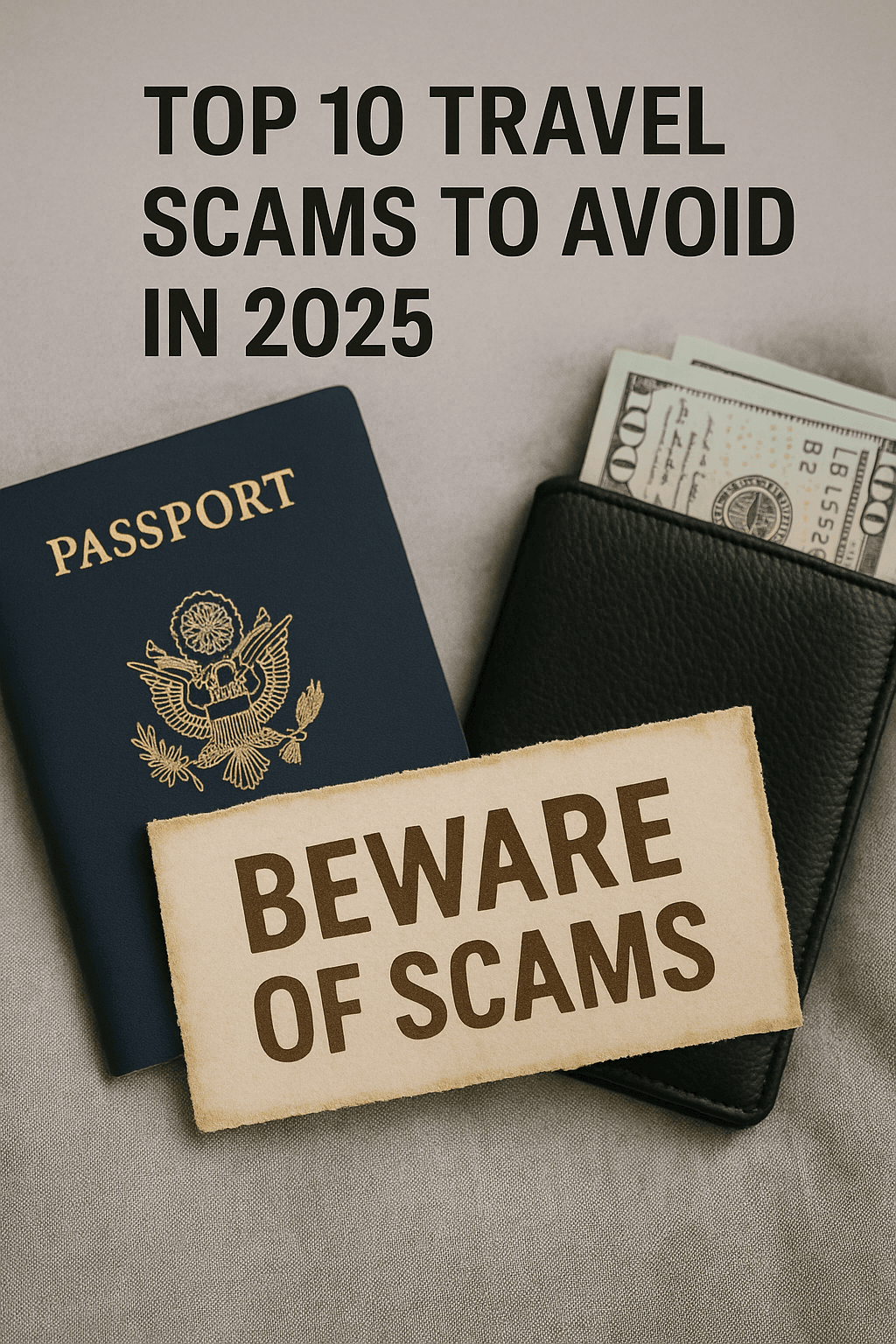Introduction:
The world is more connected than ever in 2025, and global travel has become more accessible to millions. But as international tourism rises, so does the sophistication of travel scams.
Scammers are no longer targeting only the naive. They’re targeting everyone — especially smart, tech-savvy travelers.
In this guide, we break down the top 10 most common travel scams around the world, with updated tactics for 2025, and give you smart, realistic ways to avoid getting caught off guard.
1. Fake QR Code Scams
How it works:
Scammers place stickers with fake QR codes over real ones at restaurants, train stations, or payment terminals. When scanned, they lead you to a phishing site or malicious payment portal.
How to avoid it:
- Never scan random QR codes in public.
- Use NFC or verified apps.
- Double-check that the QR sticker isn’t peeling off or layered over another.
2. The “Free Wi-Fi” Trap
How it works:
You connect to an open network at a café, airport, or hotel. But it’s actually a rogue hotspot capturing your login data.
How to avoid it:
- Never access banking or sensitive sites on public Wi-Fi.
- Always use a VPN.
- Carry your own hotspot or use mobile data.
3. Currency Exchange Manipulation
How it works:
Some currency exchange kiosks display misleading rates or charge hidden commissions. Others may swap out counterfeit notes.
How to avoid it:
- Use reputable banks or ATMs.
- Use digital wallets like Wise or Revolut.
- Count your money before leaving the counter.
4. The “Closed Hotel” Scam
How it works:
A taxi driver tells you your hotel is “closed” or “fully booked” and takes you to another hotel where they get commission.
How to avoid it:
- Confirm your hotel’s status directly by calling.
- Don’t rely solely on drivers for local info.
- Pre-book with clear confirmations and GPS directions.
5. Fake Police Officers
How it works:
People dressed as police ask for your ID or wallet to “check for fake currency” or illegal items — and take your money or info.
How to avoid it:
- Ask to see official ID and badge numbers.
- Don’t hand over documents; show them through a transparent holder.
- Walk to the nearest police station if unsure.
6. Card Skimming Devices on ATMs
How it works:
Fraudsters install skimming devices or hidden cameras at ATMs to steal card data.
How to avoid it:
- Use indoor ATMs at banks or hotels.
- Cover the keypad when entering your PIN.
- Check the card slot for loose or bulky attachments.
7. Street Petition Scam
How it works:
You’re asked to sign a petition for a charity or cause. While distracted, your bag or wallet is stolen.
How to avoid it:
- Avoid engaging with aggressive street solicitors.
- Secure your belongings in front of your body.
- Keep walking if it feels off.
8. Fake Ride-Sharing Apps or Drivers
How it works:
Scammers use unofficial ride apps or pose as rideshare drivers. They charge inflated prices or divert you.
How to avoid it:
- Always book through official apps.
- Check driver name, license plate, and photo.
- Never get into a car without confirming booking details.
9. Restaurant Menu Switch
How it works:
You’re shown a cheap menu at the entrance, but after ordering, you’re given a different, higher-priced menu or charged extras.
How to avoid it:
- Take a photo of the menu when ordering.
- Confirm prices before ordering.
- Ask for a printed bill and double-check it.
10. The “Friendship” Scam
How it works:
A local offers to show you around or have drinks. Later, they leave you with a massive bill or disappear.
How to avoid it:
- Be cautious of overly friendly strangers.
- Avoid going to unknown bars or clubs with people you just met.
- Stick to public spaces and trust your instincts.
Bonus Tips to Outsmart Scammers in 2025:
- Use travel insurance that covers fraud or theft.
- Keep backup cards in a separate location.
- Enable location tracking on your devices.
- Avoid over-sharing your location on social media.
- Learn a few local language phrases to avoid looking completely lost.
- Use real-time review apps like Google Maps and TripAdvisor to validate businesses or service providers.
Final Thoughts:
Traveling in 2025 can be incredibly rewarding — but only if you stay smart and alert.
Scammers are constantly evolving, but so can you.
With the right awareness and tools, you can enjoy the world without falling for common traps.
Remember, the best travelers are not just adventurous — they’re prepared.
Stay curious, not careless.
